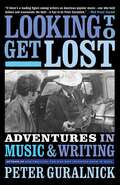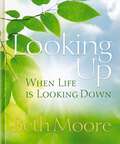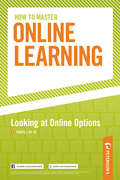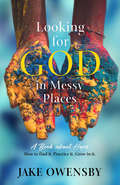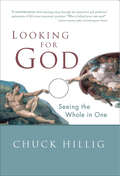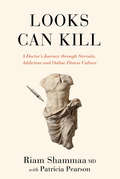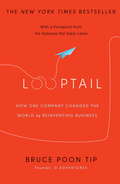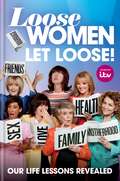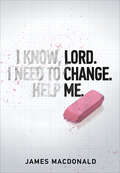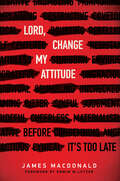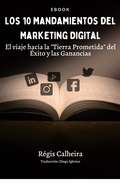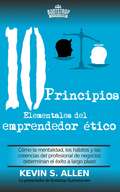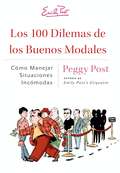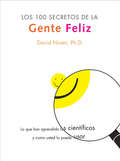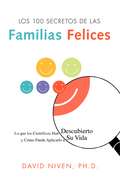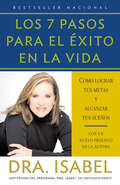- Table View
- List View
Looking To Get Lost: Adventures in Music and Writing
by Peter GuralnickBy the bestselling author of Sam Phillips: The Man Who Invented Rock &‘n&’ Roll and Last Train the Memphis: The Rise of Elvis Presley, this dazzling new book of profiles is not so much a summation as a culmination of Peter Guralnick&’s remarkable work, which from the start has encompassed the full sweep of blues, gospel, country, and rock 'n' roll. It covers old ground from new perspectives, offering deeply felt, masterful, and strikingly personal portraits of creative artists, both musicians and writers, at the height of their powers. &“You put the book down feeling that its sweep is vast, that you have read of giants who walked among us,&” rock critic Lester Bangs wrote of Guralnick&’s earlier work in words that could just as easily be applied to this new one. And yet, for all of the encomiums that Guralnick&’s books have earned for their remarkable insights and depth of feeling, Looking to Get Lost is his most personal book yet. For readers who have grown up on Guralnick&’s unique vision of the vast sweep of the American musical landscape, who have imbibed his loving and lively portraits and biographies of such titanic figures as Elvis Presley, Sam Cooke, and Sam Phillips, there are multiple surprises and delights here, carrying on and extending all the themes, fascinations, and passions of his groundbreaking earlier work.
Looking Up When Life is Looking Down: Finding God's Love and Faithfulness When You're in the Pit
by Beth MooreWhen life is looking down, look up and find God’s deliverance! Life can be hard…sometimes to the point of feeling as though your struggles will never end and God isn’t anywhere near. In Looking Up When Life is Looking Down, Beth Moore shares a prosaic message of hope and deliverance taken from Psalm 40, helping readers discover they indeed are not alone and that God’s gracious provision of love and faithfulness is at work in their circumstances. This lovely full-color gift book is based on Beth Moore's best selling book, Get Out of That Pit.
Looking at Online Options
by Peterson'sThis eBook is Part I from Peterson's How to Master Online Learning which provides the most comprehensive information about online degree programs, online certifications, and continuing education; advice on paying for online classes, software, and textbooks; and expert strategies for online learning success.
Looking for God in Messy Places: A Book About Hope
by Jake Owensby“This is beautiful and brilliant stuff, profound and plain, incredibly human, wise and charming. I trusted and enjoyed every word.” –Anne Lamott, New York Times bestselling author about Looking for God in Messy PlacesFor any who feel frustrated and world-weary, and who want more than just wishful thinking or superficial spirituality, this book is for you! In these pages, my friend Jake Owensby poignantly shows how LOVE is what can truly give us hope to carry on: real love, God's love for us, our love for each other, right here, right now in all the struggles of this messy life. And God knows, we need this book NOW!—Bishop Michael Curry, Presiding Bishop of The Episcopal Church and author of Love is the Way: Holding on to Hope in Troubling TimesLife is messy. We can get discouraged by setbacks, overwhelmed by busyness, and shaken by worry. Hope is the power that gets us out of bed in the morning and gives us the courage to face adversity. Looking for God in Messy Places by Jake Owensby is a book about how love gives us an inextinguishable hope.This book is for anyone who has ever been frozen in place by loss or regret, anyone who has endured suffering, cruelty, or rejection. From word to word and page to page, readers will experience themselves as God’s beloved—so that they can be hopeful. From the introduction[This book is] For those whose struggles have been long and for those who are growing weary from heavy burdens. For those facing an unforeseen crisis or for those enduring a slow personal train wreck. For those whose throats have grown raw from crying for justice and for those whose wounds have gone unhealed. This is a book about hope, and I have written it especially for those who refuse to yield to discouragement and despair.Topics include:- The power of love to give us hope- The ways that God shows up in our daily lives- Recognizing God’s call in our lives- Becoming your true self - Having a sense of belonging- Forming a friendship with Christ- Contemplative faith
Looking for God: Seeing the Whole in One
by Chuck HilligA spiritual teacher’s romp through life’s most profound mysteries—the hole at the center of our lives, and the wholeness of our connection with God.In Looking for God, spiritual teacher and psychotherapist Chuck Hillig offers a simple yet profound message delivered in lighthearted prose. Guiding readers to explore “the empty wholeness of who you really are,” Hillig uses the central metaphor of a hole—represented in this eBook edition by a large black dot at the center of each page. By pointing to the hole, Hillig asks us to confront the emptiness we may fear in ourselves, while also recognizing the (w)holeness of our unity with God. This unique and uplifting book is a gift of inspiration to all readers who search for happiness and love.
Looks Can Kill: A Doctor's Journey through Steroids, Addiction and Online Fitness Culture
by Patricia Pearson Riam ShammaaA leader in sports medicine reveals the prevalence of anabolic steroids and appearance-enhancing drugs for recreational use, and explodes the myths and silence around these dangerous drugs of choice for the Instagram era.From fitspiration vlogs touting "fit" as the new skinny to magazines imploring men to get "shredded" and "massive" in the gym, fitness stars and elevated body-image standards are driving a burgeoning industry meant, ostensibly, to make us all more healthy. But are those images of rippling abs, bulging shoulders and tiny waists truly inspiring good health? In this book, leading sports doctor (and former champion powerlifter) Riam Shammaa exposes the dirty secret of online fitness culture: rampant steroid and drug use, not only amongst its Instagram stars and wellness gurus, but eagerly enjoined by millions seeking to emulate a new beauty ideal (and its myth, of being all-natural). Never mind the high-profile cases of athletes Marion Jones and Lance Armstrong. Steroids and other pharmaceuticals are being sold and consumed in life-threatening quantities online and through the backrooms of gyms and fitness centres, and the people buying them range from teen girls trying to look good on Instagram to middle-aged men who can't say good-bye to their youthful physiques. This is a vivid, eye-opening and compassionate journey alongside a young doctor as he discovers an underworld of misinformation and misdirected ambition, drug abuse and lives cut short for the glory of competition, pageantry or the mistaken belief that we need to be fantastically beautiful in order to be fit.
Looptail: How One Company Changed the World by Reinventing Business
by Bruce TipLooptail is Bruce Poon Tip's extraordinary first-person account of his entrepreneurial instincts to start and develop G Adventures, the highly successful international travel adventure company - and along the way he reveals his unusual management secrets that not only keep his employees fully engaged and energized but also keep his customers extremely happy.His unique appraoch has worked in marvellous ways. Poon Tip has created an entirely new and refreshing approach to management. For example, there is no CEO at G Adventures - instead, every employee is a CEO, empowered to make instantaneous decisions to help clients on the spot. But while there's no CEO, there is a company Mayor, who take the pulse of corporate morale. There's no HR department - but there is a Talent Agency and company Culture Club.It hasn't always been easy to try to balance his desire for a socially responsible company along with the desire to generate profits. But thanks to Poon Tip's vision, G Adventures has floruished and has done its best to maintain its looptail approach. In short, it's been an extraordinary ride, and in many ways G Adventures is at the vanguard of what modern-day companies are beginning to look like.
Looptail: How One Company Changed the World by Reinventing Business
by Bruce TipLooptail is Bruce Poon Tip's extraordinary first-person account of his entrepreneurial instincts to start and develop G Adventures, the highly successful international travel adventure company - and along the way he reveals his unusual management secrets that not only keep his employees fully engaged and energized but also keep his customers extremely happy.His unique appraoch has worked in marvellous ways. Poon Tip has created an entirely new and refreshing approach to management. For example, there is no CEO at G Adventures - instead, every employee is a CEO, empowered to make instantaneous decisions to help clients on the spot. But while there's no CEO, there is a company Mayor, who take the pulse of corporate morale. There's no HR department - but there is a Talent Agency and company Culture Club.It hasn't always been easy to try to balance his desire for a socially responsible company along with the desire to generate profits. But thanks to Poon Tip's vision, G Adventures has floruished and has done its best to maintain its looptail approach. In short, it's been an extraordinary ride, and in many ways G Adventures is at the vanguard of what modern-day companies are beginning to look like.
Loose Women: Our Life Lessons Revealed
by ITV Ventures Limited*For 20 years the Loose Women panellists have been entertaining the nation with their forthright opinions on the vagaries of modern life. For the first time, they have come together to share intimate thoughts, fears, memories and anecdotes that are both thought-provoking and entertaining in equal measure.Loose Women: Let Loose! takes on the essential subjects of Love, Sex, Self-Esteem, Friendships, Family, Body Image and Wellness. Whether it is parenting advice from Nadia ('It's important to have a support network when you're a new parent'); Gloria's experience with bereavement ('Losing a child changes you, you can't be the same person'); Coleen's feelings about love ('I do believe there is "the one" - for now'); or Janet's take on mental health ('It doesn't need to be triggered by splitting up or a death, it could be happening in small ways'), there are stories that have never been shared before alongside the show's best bits, making Loose Women: Let Loose! a hilarious and honest guide to handling life's ups and downs as a 21st-century woman.
Loose Women: Our Life Lessons Revealed
by ITV Ventures LimitedFor 20 years the Loose Women panellists have been entertaining the nation with their forthright opinions on the vagaries of modern life. For the first time, they have come together to share intimate thoughts, fears, memories and anecdotes that are both thought-provoking and entertaining in equal measure.Loose Women: Let Loose! takes on the essential subjects of Love, Sex, Self-Esteem, Friendships, Family, Body Image and Wellness. Whether it is parenting advice from Nadia ('It's important to have a support network when you're a new parent'); Gloria's experience with bereavement ('Losing a child changes you, you can't be the same person'); Coleen's feelings about love ('I do believe there is "the one" - for now'); or Janet's take on mental health ('It doesn't need to be triggered by splitting up or a death, it could be happening in small ways'), there are stories that have never been shared before alongside the show's best bits, making Loose Women: Let Loose! a hilarious and honest guide to handling life's ups and downs as a 21st-century woman.
Lord Change Me
by James MacDonaldAre you truly serious about allowing the power of God to transform your life? If you are, then prepare yourself for an incredible, life-changing experience. Change is difficult, but it's made even harder without practical guidance on how to do it. You will find that guidance in Lord, Change Me Now. James MacDonald is serious about the business of change according to God's Word. While many tell us that we should change and be more like Christ, MacDonald actually teaches us how to do it. Lord, Change Me Now is split into three sections as the model for approaching change:The Preparation for Change: choosing the right method and partnering with God to select the areas in need of change in your life. The Process of Change: exploring the biblical method of saying 'no' to sinful patterns and 'yes' to the things God desires for you. The Power to Change: explaining how to experience the power of God personally and continuously. This is a book about a different you. There are no warm fuzzies within these pages. Rather, MacDonald is a direct, to-the-point pastor with a heart for seeing lives completely transformed by the truth of the Gospel. If you're serious about changing your life, this book is just what you need.
Lord Change Me
by James MacDonaldAre you truly serious about allowing the power of God to transform your life? If you are, then prepare yourself for an incredible, life-changing experience. Change is difficult, but it's made even harder without practical guidance on how to do it. You will find that guidance in Lord, Change Me Now. James MacDonald is serious about the business of change according to God's Word. While many tell us that we should change and be more like Christ, MacDonald actually teaches us how to do it. Lord, Change Me Now is split into three sections as the model for approaching change:The Preparation for Change: choosing the right method and partnering with God to select the areas in need of change in your life. The Process of Change: exploring the biblical method of saying 'no' to sinful patterns and 'yes' to the things God desires for you. The Power to Change: explaining how to experience the power of God personally and continuously. This is a book about a different you. There are no warm fuzzies within these pages. Rather, MacDonald is a direct, to-the-point pastor with a heart for seeing lives completely transformed by the truth of the Gospel. If you're serious about changing your life, this book is just what you need.
Lord, Change My Attitude: Before It's Too Late
by James MacDonaldChange your attitude, change your life.We&’re very good at explaining why we&’re unhappy: bad job, bad relationships, bad luck. But there&’s probably a better reason: bad attitudes.In Lord, Change My Attitude, James MacDonald shows us just how much our attitudes affect our lives. One of his bestsellers, this book is classic James: It&’s clear, it&’s inspiring, and it packs a punch. Drawing from the experience of the Israelites who grumbled through the wilderness, MacDonald shows how bad attitudes rob us of joy. Coveting, complaining, and being critical are not what our hearts were made for. They were made for thankfulness, contentment, and love. Is your heart straining under the weight of a bad attitude? Don&’t read this book if you&’re looking for a quick fix. Don&’t read this book if you&’re unwilling to change. Read it if you&’re ready for a serious, inside-out attitude adjustment.
Lord, Change My Attitude: Before It's Too Late
by James MacDonaldChange your attitude, change your life.We&’re very good at explaining why we&’re unhappy: bad job, bad relationships, bad luck. But there&’s probably a better reason: bad attitudes.In Lord, Change My Attitude, James MacDonald shows us just how much our attitudes affect our lives. One of his bestsellers, this book is classic James: It&’s clear, it&’s inspiring, and it packs a punch. Drawing from the experience of the Israelites who grumbled through the wilderness, MacDonald shows how bad attitudes rob us of joy. Coveting, complaining, and being critical are not what our hearts were made for. They were made for thankfulness, contentment, and love. Is your heart straining under the weight of a bad attitude? Don&’t read this book if you&’re looking for a quick fix. Don&’t read this book if you&’re unwilling to change. Read it if you&’re ready for a serious, inside-out attitude adjustment.
Lord, I Want to Be Whole
by Stormie O'MartianBriefly describes the author's difficult childhood and the choices that led her into a destructive lifestyle that eventually left her empty and alone, then presents seven steps for living the Christian life in obedience to God. Includes a discussion of how to release the past, confess sins before God, seek deliverance from past bondage, and stand strong in freedom from pain. Offers ways to seek emotional, physical, and spiritual wholeness following abuse or trauma.
Lord, Please Make Him Stop Drinking: The Christian Woman's Guide to Thrive No Matter What
by Christine Lennard FolkLord Please Make Him Stop Drinking provides clear biblical examples of how wives can experience peace in their home from the up and down roller coaster of an alcoholic husband. Christine Folk, communications coach and founder of Epiphany Approach, has put her wisdom on the page in Lord Please Make Him Stop Drinking. Within its pages, Christine provides new skills for women to use when that angry alcoholic side of their husband shows up again. Lord Please Make Him Stop Drinking lays out a practical approach to applying God’s word to tumultuous situations and shows women how to:Resist being provoked into his argument … againSpeak to him in "his" language and get him to stop yelling Reduce the intensity and frequency of his rants Know what his real problem is Know exactly what God is trying to tell them
Los 10 Mandamientos del Marketing Digital: El viaje hacia la "Tierra Prometida" del Éxito y las Ganancias
by Régis CalheiraDIARIAMENTE RECIBO MENSAJES POR EMAIL, WHATSAPP Y DIRECTOS EN INSTAGRAM PREGUNTANDO COSAS DEL ESTILO: "CÓMO HAGO PARA GANAR DINERO EN INTERNET?", "CÓMO LOGRO MI PRIMER VENTA?", "HACE 2 MESES QUE LO INTENTO Y NADA...QUÉ ESTOY HACIENDO MAL?" ANALIZANDO LO QUE CADA UNO ME DICE Y VIENDO LO QUE ELLOS HAN HECHO, PERCIBO QUÉ COSAS BÁSICAS NO ESTÁN SIENDO OBSERVADAS, COSAS QUE SERÍAN EL FUNDAMENTO DE UN TRABAJO EN EL MARKETING DIGITAL DE FORMA SUSTENTABLE PARA GENERAR LUCROS FRECUENTES. BROMEO CON MIS AMIGOS Y PERSONAS A LAS QUE DOY CONSULTORÍA Y MENTORÍA QUE ESOS FUNDAMENTOS SON LOS MANDAMIENTOS QUE, EN CASO QUE USTED NO LOS SIGA, ES SEGURO QUE IRÁ AL "INFIERNO" DE TODO EMPRENDEDOR - EL FRACASO. ESTE EBOOK ES LA COMPILACIÓN DE LOS 10 MANDAMIENTOS QUE ENSEÑO A TODO PEREGRINO QUE CRUZA MI CAMINO EN ESTA JORNADA DE BÚSQUEDA DEL ÉXITO.
Los 10 principios elementales del emprendedor ético
by Trad. Públ. Mariano Saab Kevin S AllenCon millones de libros sobre emprendimientos en el mercado, ¿qué hace que Los 10 principios elementales del emprendedor ético sea diferente? La mayoría de estos libros están llenos de planes para hacerte rico y ganar dinero rápidamente. Sin embargo, este libro no expresa ninguna de esas ideas. Te voy a enseñar cómo crear y desarrollar un negocio con honestidad, integridad y un enfoque inquebrantable sobre el cliente, no solo en el dinero. Lo mejor de Los 10 principios elementales del emprendedor ético es que cualquier persona puede poner en marcha estos valores fundamentales en todas las relaciones comerciales y personales, sin contar con una capacitación especializada. Volverse un emprendedor puede ser desafiante, pero también muy gratificante. Requiere de trabajo duro, dedicación y sacrificio. Cuando estás absorto en conseguir dinero, te olvidas de la razón por la que quisiste ser un emprendedor inicialmente: ayudar a los demás y marcar la diferencia. Si bien los siguientes principios no garantizan éxito económico, te ayudarán a desarrollar una actividad comercial honesta.
Los 100 Dilemas de los Buenos Modales
by Peggy PostíAl fin! Soluciones claras para aquellos momentos inevitables e incómodos de la vida. Alguna vez se ha molestado con aquellas personas que no dejan de hablar en sus teléfonos celulares, que se le atraviesan en las colas o que no paran de susurrar en el cine? Se ha preguntado quién debe pagar la cuenta cuando salen a comer a un restaurante? Alguna vez ha recibido un regalo que no le gusta? Ha llegado a quedarse sin palabras cuando le han hecho una pregunta indiscreta? Peggy Post, la experta en etiqueta dentro de Estados Unidos, llega a su rescate con este manual preciso y apropiado que nos ayuda a contestar aquello que alguna vez hemos dudado sobre los principales 100 dilemas de los buenos modales.
Los 100 Secretos de la Gente Feliz
by David NivenLos científicos y académicos llevan años intentando descubrir qué es lo que hace feliz a la gente. Pero sus investigaciones tienden a quedar escondidas en diversas publicaciones académicas y científicas, sin jamás llegar al alcance de la gente común. Por eso, en Los 100 Secretos dela Gente Feliz, el científico social y psicólogo, David Niven, Ph. D. , nos presenta de manera clara y comprensiva, lo esencial de los miles de estudios científicos que se han hecho acerca de la felicidad. El autor ilustra con ejemplos y explicaciones, cada una de las cien técnicas, actitudes y costumbres que nos ayudan a transformar una vida mediocre y sin gracia, en una vida llena de felicidad. CREE EN TI MISMO: No importa la edad, el sexo o el origen: creer en sí mismo aumenta la satisfacción en la vida de un 40 por ciento, haciéndonos más felices tanto en la casa como en el trabajo. APAGA LA TELEVISIÓN: Mirar demasiada televisión puede triplicar nuestro antojo de posesiones, lo que reduce nuestro nivel de satisfacción personal de 5 por ciento por cada hora de televisión que miramos. NO OLVIDES DIVERTIRTE: La diversión es una de las cinco claves para llevar una vida satisfecha. La gente que se toma el tiempo de divertirse tiene 20 por ciento más de posibilidades de ser feliz, y 36 por ciento más de posibilidades de sentirse a gusto con su edad y la etapa en la que se encuentra en la vida.
Los 100 Secretos de las Familias Felices: Lo que los Científicos Han Descubierto y Cómo Puede Aplicarlo a Su Vida (100 Secretos Ser.)
by David NivenLa Ciencia de una Familia Feliz ¿Cuál es la diferencia entre las personas que tienen relaciones íntimas y cariñosas con sus familias, y aquellas que tienen relaciones tensas y frustrantes? Sociólogos, terapeutas y siquiatras se han pasado toda una vida investigando los pormenores de la dinámica familiar, pero sus hallazgos tienden a quedar ocultos en publicaciones académicas que sólo leen otros expertos. Ahora, David Niven, autor bestseller a nivel internacional de la serie Los 100 Secretos ha reunido la información más reciente e importante de más de mil estudios científicos que se han hecho acerca de familias. Niven nos explica estos descubrimientos en un lenguaje sencillo y fácil de comprender, resumiéndolo todo en cien consejos claves que nos ayudarán a encontrar y mantener el amor, la felicidad y la satisfacción en nuestras relaciones familiares. No olvide el pasado: Los padres que comparten la historia de su familia con sus hijos generan en ellos un alto nivel de interés por otros miembros de la familia y aumentan la probabilidad de que sus hijos sean felices. Sin precio: Una vez suplidas todas las necesidades básicas, la situación económica de su familia no tendrá ningún impacto sobre qué tan satisfechos se sienten con sus vidas. Escuche la opinión de todos: Las personas de edad que tienen dificultad viviendo solas tienen un 84 por ciento más de probabilidades de estar satisfechas con su situación de vivienda si sienten que su opinión es esencial a la hora de elegir un nuevo hogar. El mejor regalo: La gente que está contenta con su vida familiar tiene un 72 por ciento más de probabilidades de estar satisfecha con su vida en general.
Los 15 milagros del amor: Una vida llena de milagros no es mAs que
by Spencer HoffmannHoy en día vivimos educados en base al miedo. No es ninguna sorpresa que crezcamos reprimiendo nuestros sueños y nuestras aspiraciones y simplemente llegamos a aceptar una vida mediocre limitando todo nuestro potencial. Este libro te enseñará cómo transformar la emoción conductora de tu vida que por mucho tiempo ha sido miedo y ego en amor. Una vez que comenzamos a vivir desde esta perspectiva, literalmente, la vida comienza a ser milagrosa, comenzamos a hacer posible lo que antes parecía imposible. El libro está dividido en una introducción, 15 capítulos que son los 15 milagros del amor descritos en el libro y finalmente una conclusión o palabras finales. Cada capítulo está dividido en distintas secciones descritas a continuación. 1) Explicación del milagro, sus beneficios etc. a través de historias. 2) Reflexión respecto a problemas o situaciones de la vida cotidiana y cómo el milagro puede crear un gran cambio e impacto en nuestra vida 3) Ejercicios y compromisos que el lector podrá asumir después de cada capítulo para comenzar a vivir los milagros del amor y ver los resultados manifestados en su vida.
Los 7 pasos para el exito en la vida
by Isabel Gomez-BassolsLa Dra. Isabel, anfitriona del programa de consejos más popular en Univision Radio, sabe lo que hace falta para triunfar. Y no importa cómo definas el éxito --establecer tu propio negocio, comprar tu primera casa, obtener una mejor educación-- en Los 7 pasos para el éxito en la vida, ella te enseña cómo llegar allí. Legiones de radioescuchas fieles confían en los consejos sensatos y comprensivos de la Dra. Isabel. En Los 7 pasos para el éxito en la vida, aprenderás cómo: · Definir tus metas: si no sabes a dónde te diriges, nunca llegarás · Dividir tus metas en pasos más fáciles de manejar· Tomar el control de tus finanzas· Usar tu tiempo eficientemente, sin malgastarlo· Cuidar tu salud --sin ella, el triunfo no vale nada· Alimentar tu espíritu· Desarrollar una red de apoyo en la que puedas confiar· Y mucho, mucho más No dejes para mañana el triunfo y éxito que tanto anhelas hoy --todo viaje comienza con un primer paso. ¡Permite que la Dra. Isabel te ayude a encontrar tu camino hacia el éxito!From the Trade Paperback edition.
Los 7 pasos para el éxito en el amor
by Isabel Gomez-BassolsEn sus otros libros, la Dra. Isabel te enseñó cómo preparar el camino hacia un mejor futuro y encontrar la verdadera felicidad. Ahora, con Los 7 pasos para el éxito en el amor, la anfitriona del programa de consejos más popular en Univision Radio te ofrece la guía imprescindible para lograr una relación de pareja feliz y sana en tan sólo siete pasos. Utilizando ejercicios prácticos, formularios fáciles y ejemplos de la vida real, la Dra. Isabel te enseña cómo: · Crear la intimidad física, emocional y espiritual que forma el vínculo más fuerte que puede existir entre dos seres humanos· Quitar las piedras en el camino de la comunicación y utilizar el lenguaje verbal y corporal que nos une en vez de separarnos· Reconocer y manejar los patrones de conducta que afectan una relación· Solucionar los problemas de pareja sin ira y sin herir· Encontrar el camino hacia el amor en tan sólo 20 minutos cada día· Disfrutar de una vida sexual dinámica, intensa y romántica en todas las etapas de la vida· Y mucho, mucho más ¿Te quejas de tener mala suerte en el amor? ¿Quieres mejorar tu relación actual? ¡Decídete a fortalezer esos lazos de amor con la ayuda de la Dra. Isabel!From the Trade Paperback edition.
Los 7 pasos para el éxito en el amor
by Isabel Gomez-BassolsEn sus otros libros, la Dra. Isabel te enseñó cómo preparar el camino hacia un mejor futuro y encontrar la verdadera felicidad. Ahora, con Los 7 pasos para el éxito en el amor, la anfitriona del programa de consejos más popular en Univision Radio te ofrece la guía imprescindible para lograr una relación de pareja feliz y sana en tan sólo siete pasos. Utilizando ejercicios prácticos, formularios fáciles y ejemplos de la vida real, la Dra. Isabel te enseña cómo: · Crear la intimidad física, emocional y espiritual que forma el vínculo más fuerte que puede existir entre dos seres humanos· Quitar las piedras en el camino de la comunicación y utilizar el lenguaje verbal y corporal que nos une en vez de separarnos· Reconocer y manejar los patrones de conducta que afectan una relación· Solucionar los problemas de pareja sin ira y sin herir· Encontrar el camino hacia el amor en tan sólo 20 minutos cada día· Disfrutar de una vida sexual dinámica, intensa y romántica en todas las etapas de la vida· Y mucho, mucho más ¿Te quejas de tener mala suerte en el amor? ¿Quieres mejorar tu relación actual? ¡Decídete a fortalezer esos lazos de amor con la ayuda de la Dra. Isabel!
